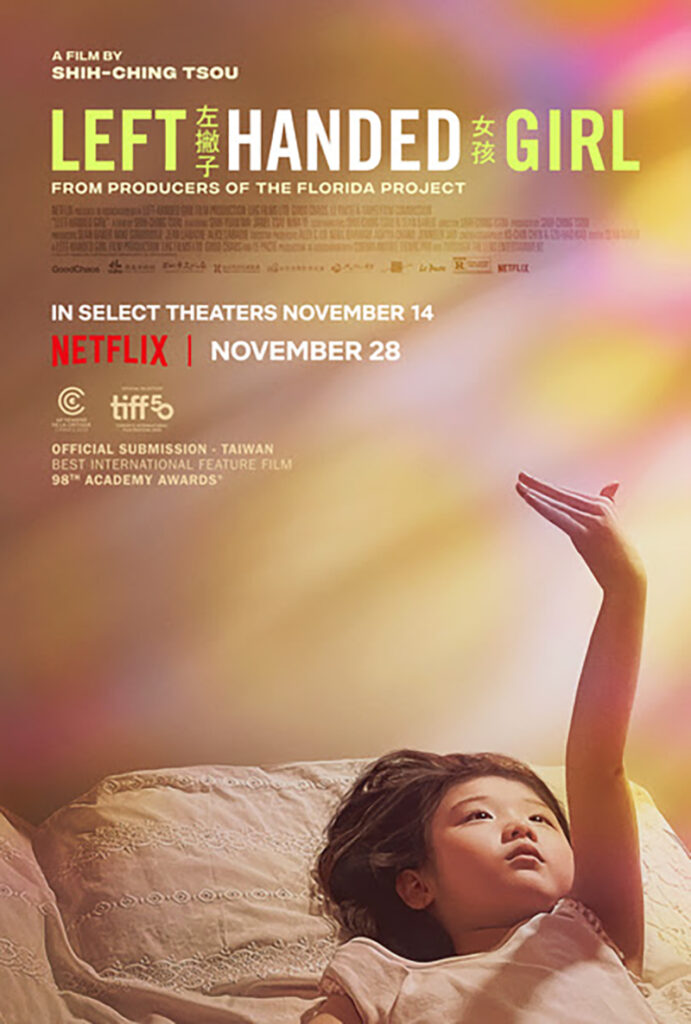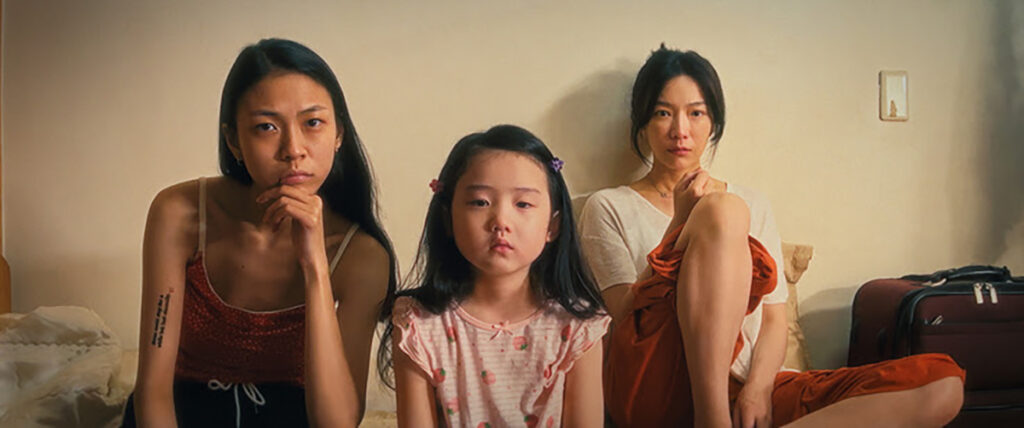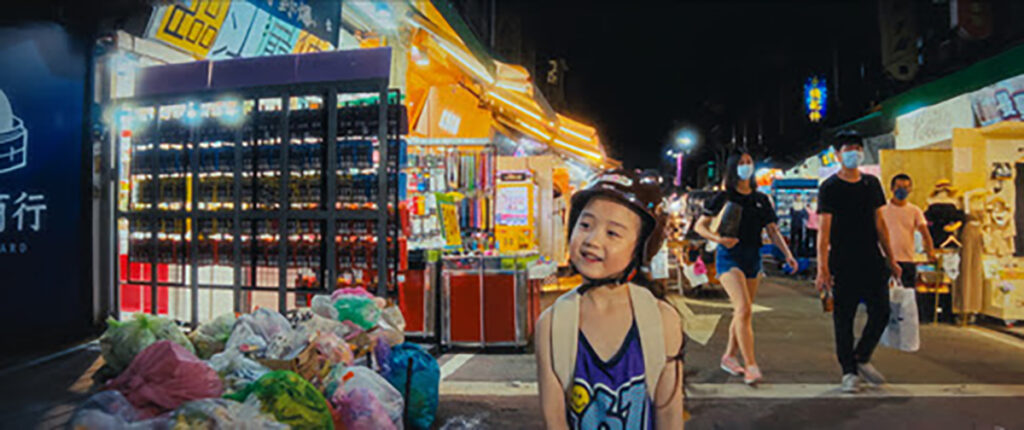By Kai Curry
NORTHWEST ASIAN WEEKLY
 Things are likely to get worse before they get better, yet surely there’s a light at the end of this tunnel. And we’re along for the ride. This is “Left-Handed Girl,” a movie that signifies director, producer, and co-writer Shih-Ching Tsou’s return to her childhood in Taipei, Taiwan.
Things are likely to get worse before they get better, yet surely there’s a light at the end of this tunnel. And we’re along for the ride. This is “Left-Handed Girl,” a movie that signifies director, producer, and co-writer Shih-Ching Tsou’s return to her childhood in Taipei, Taiwan.
The intergenerational drama, which premiered at Cannes Film Festival Critics’ Week, is Tsou’s first attempt at solo directing. It is co-written, produced, and edited by Sean Baker, who was at the helm of the acclaimed “Anora.” The movie, which is part Tsou’s memories, part the memories of Tsou’s family and friends, tells the story of a family that is a bit lost. Three women—a mother, an older sister, and a younger sister—have all returned to Taipei from the countryside, for reasons unclear. We learn not too long after their return that the father abandoned the mother (“Shu Fen” played by Janel Tsai), again for reasons unclear.

From left to right: Troubled young adult (Shih-Yuan Ma), troubled kid (Nina Ye), troubled mom (Janel Tsai)
This is life right above the edge. Just about anything could tip this family over, either one by one or all together. They move into a small apartment, and the mom starts working at a night market selling noodles. The mom and the older sister (“I-Ann” played by Shih-Yuan Ma) are grumpy 24/7. The littlest (“I-Jing” played by Nina Ye) is pretty much left to her own devices. You get the dynamic right away. The three driving into Taipei. The mom complaining about the traffic (has she been to Seattle? Taipei’s traffic looked dreamy in comparison), the oldest daughter griping about the youngest, while the youngest is having a blast looking through a kaleidoscope and exclaiming about the amazing, magical land which they are entering. That dynamic continues.

Shu-Fen (Janel Tsai), left, and I-Ann, right (Shih-Yuan Ma), arguing over the head of I-Jing (Nina Ye), ctr, in every meaning of the phrase.
In spite of their curtailed circumstances, everyone settles in fairly quickly. I-Jing is off to school, which might be the best part of her day, and instantly making friends with everyone except her family members. I-Ann, after an argument with her mom, wants to prove she can make more money than at a stupid noodle shop, and seemingly and instantly gets work at a betel nut seller. We aren’t given much of a timeline, so it could have taken her a day, a week, or a month, but suffice it to say that I-Ann is quite adept at locating the seamier side of life, wherever it may be. We know that she didn’t finish high school in Taipei, another source of bitterness between mother and daughter, and can fairly and safely attribute I-Ann’s gangster attitude to family trauma as much as anything. When the mom finds out that the dad is dying in the hospital, I-Ann is instantly enraged—Why do you care? What did he ever do for you? But we have to realize that the father didn’t just abandon Shu-Fen; he abandoned I-Ann as well. I-Jing is from a different father.

I-Jing (Nina Ye) enjoys the sights, sounds, smells, and tastes of a Taipei night market.
Betel nuts are popular as drug stimulants when chewed. Although used for thousands of years, working in the selling of betel nuts is not a reputable job. We get that idea quickly when we learn that the female workers are expected to dress scantily. An older man regularly asks them to come out with him after their shifts to “go dancing.” We can only imagine that illegal sex work is right around the corner. I-Ann is gone a lot, helping pick up I-Jing from school or very inadequately running the noodle stand. It’s their neighbor at the night market (“Johnny” played by Teng-Hui Huang) who really makes sure the noodle business doesn’t go to hell, and it’s Johnny who asks, “Is your mom okay with you working there?” Whatever, says I-Ann. I’m making money.
Fairly soon after their arrival to the city, Shu-Fen takes the girls to hang with the grandparents. Not too long after that introduction, said grandparents are enlisted as babysitters for I-Jing. “Please don’t make me stay with grandpa,” I-Jing protests. “He smells like stinky tofu.” Also, grandpa is terrifying in his stringent belief in the old-fashioned curse of being left-handed.
Let’s go into this. The left hand was once (and in some places, still) thought of as unclean and impure. Unclean because for those cultures that eat with their hands, the left hand was used for wiping up after going to the bathroom. Impure because, in Christian religion, evil was always at Christ’s “left hand” or left side, while Christ’s closest allies, such as Mother Mary or Saint John, were always at his right hand or right side. That’s the same reason why today we say, “so-and-so is my right-hand man.” This wasn’t just a Christian thing, though, and might have been inherited from the Romans before Christianity gained hold.
While the abhorrence of the left hand might have started for understandable hygiene reasons, the curse of being left-handed got really out of hand (ahem) in many places, including China (Taiwan by association), Japan, and South Korea. Being left-handed also came to represent being different or non-conformist (which is why there’s a stereotype that artistic people are left-handed). Poor I-Jing is left-handed, and the titular character of the movie. When grandpa notices this at dinnertime, he instantly loses his shit. Grandma (who is involved in some shady business involving U.S. visas) tries to get him to back down, but whenever I-Jing is alone with him, she’s fair game for this particular form of torture. Grandpa forces I-Jing to use her right hand.
I-Jing, as far as I’m concerned, is the victim of neglect, and of abuse. She’s consistently ignored by her mother and sister, told to be quiet (children are expected to listen and not talk), never told what’s going on, and dropped off haphazardly at the entrances to places to fend for herself from that point (entrance to the night market, entrance to the grandparents’ apartment building). Her natural cheerfulness and wonder, sadly, is not going to survive for long in this environment. According to Tsou, I-Jing is based on a girl Tsou met at a Taiwanese night market. I-Jing is also based on Tsou herself, who remembers “being taught to stay quiet, to follow the rules, to not take up space or draw attention,” as described in a press document. This upbringing made Tsou adept at observing and “reading between the lines,” Tsou continued. I-Jing is still a bit clueless though.
I-Jing reminded me a lot of myself as a kid, too. Being left in the care of relatives, in places and situations where really anything could happen, but somehow making it through. Maybe I-Jing or another one of the characters in “Left-Handed Girl” will bring back memories for you as well.
“Left-Handed Girl” has been selected as Taiwan’s offering for the 2026 Academy Awards. It is running as a limited release in selected theaters, and will stream on Netflix on Nov. 28.
Kai can be reached at newstips@nwasianweekly.com.



